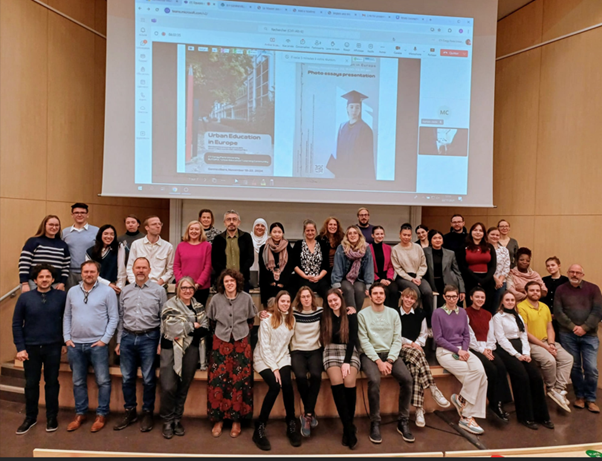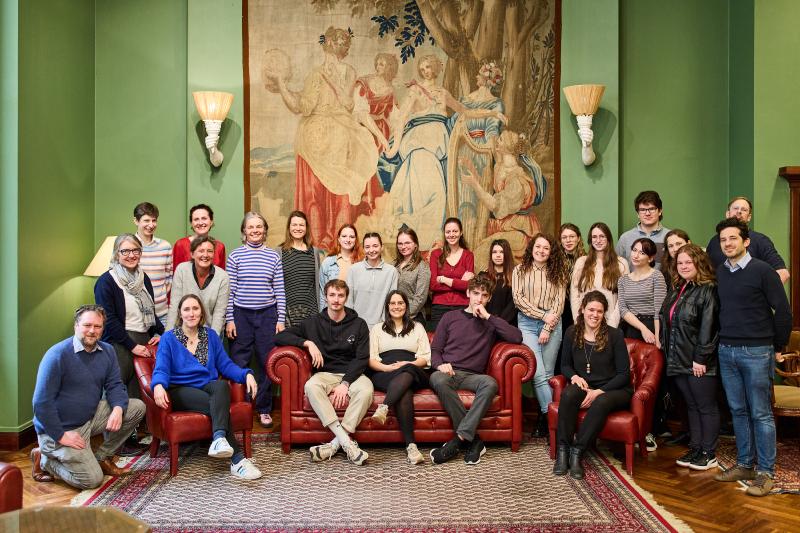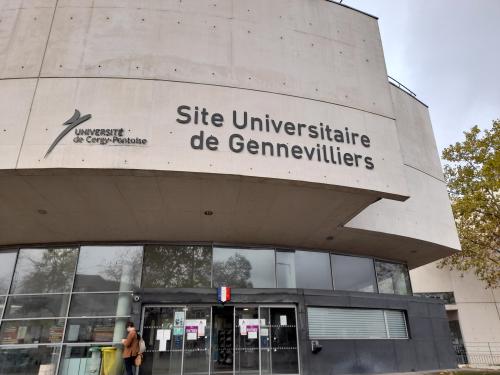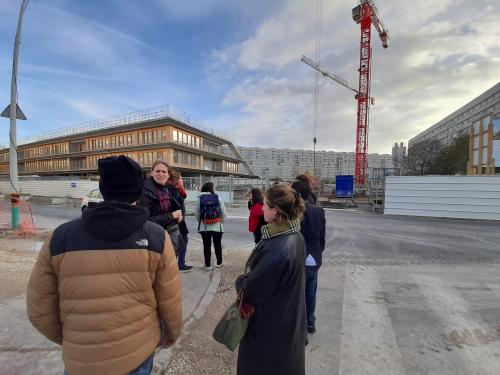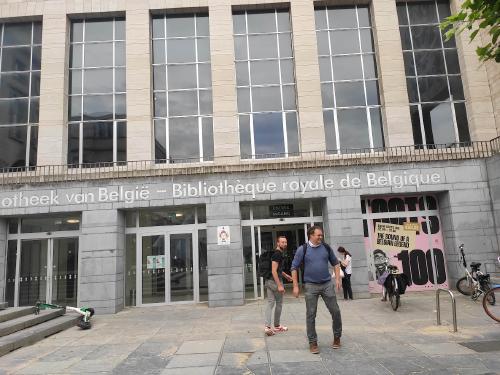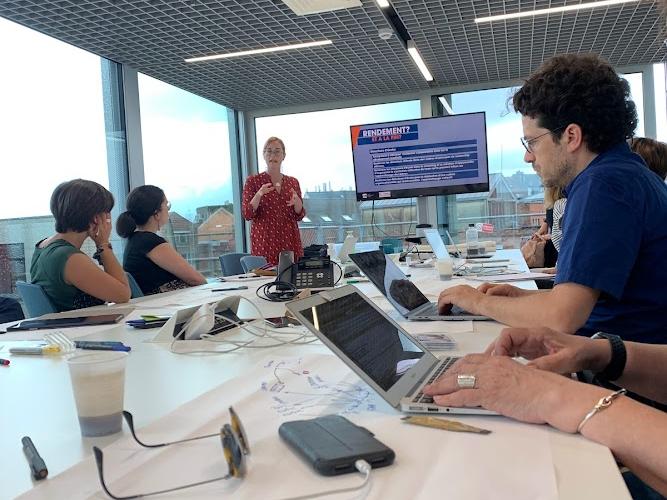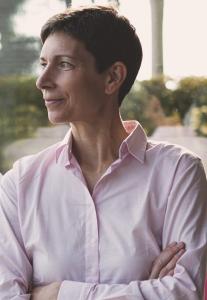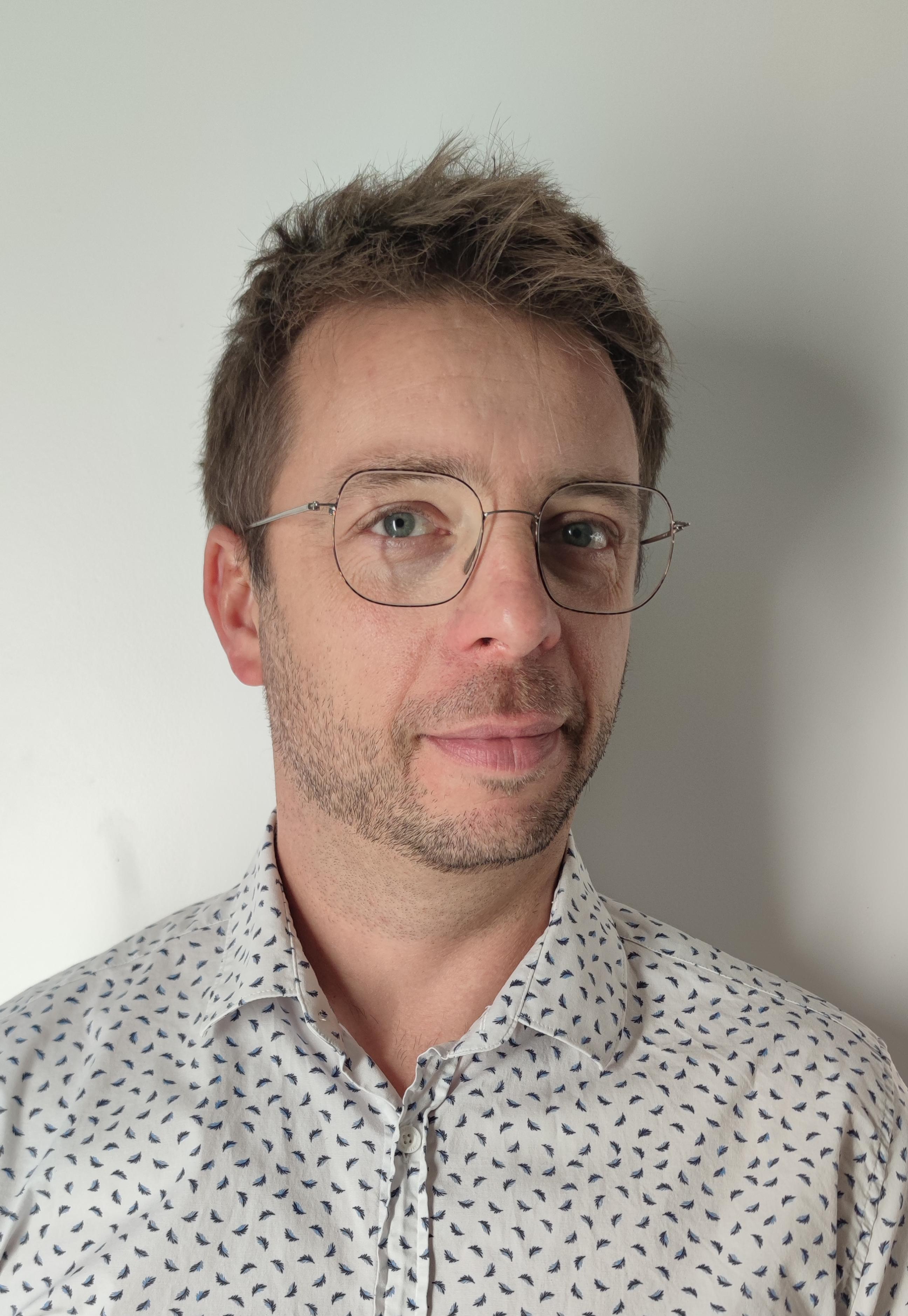You are here :
Urban Education
Pathway #1: Glossary of Key Concepts in Urban [Inclusive] Education Research
Goal? Developing a common frame of reference, as a condition for international exchange between students and staff.
Format? Annotated online glossary of key concepts, which includes an accessible abstract and key publications.
Pathway #2: Tools & skills for collaborative extended (transdisciplinary) teacher teams
Pathway #3: III. Using the city/space outside of the school as a learning environment (as well)
Goal? Connecting schools and urban societal actors / embedding the school in its broader urban living environment.
Format(s)? interactive city walks / (hybrid) spaces for interaction, connecting university, school and other societal actors.
Pathway #4: Cross campus case study reports & discussions
Goal? Case study research and cross-campus exchange.
Pathway #5: a virtual educational tour (interactive, integrating frameworks & debates) in different European cities.
Goal? Having students follow in the virtual footsteps of pupils attending school in the selected cities through a virtual tour, tapping into assets and challenges regarding education in a “super-diverse” context.
Learning Community Activities
- Upcoming Activities
-
BIP in Ljubljana, 17-21 November 2025
More info tbc soon
PROVEST
Based on the CLC Urban Education’s partnership, an important European project on professionalisation of VET educators was won: PROVEST. Main focus is to create powerful transformative learning environments for a sustainable transition. Promotor is Inge Placklé (VUB) – other EUTOPIA partners involved: CY and TUD.
LéA - Lieux d'Éducation Associés à l'IFÉ (léa-IFÉ)Building on the BIP Urban Education in November 2024 in Cergy, the ‘Institut français de l'éducation’ awarded a LéA to the CY/VUB partners, funding bilateral research and education activities between a Gennevilliers school and a school in Brussels.
- Past Activities
-
* BIP in Paris, 18-22 November 2024
EUTOPIA “Urban Education” Learning Community organised the second edition of the “Urban Education in Europe” Blended intensive programme (BIP). From November 18 to 22, students and academics from Cluj-Napoca, CY, Dresden, Gothenburg, Lljubljana and Warwik met in CY Cergy Paris University Genneviliers campus. All week long, in cooperation with various City of Gennevilliers and Éducation nationale partners, they designed photographical essays about urban education. Three public events were open to all.
Joost Vaesen, lead of the CLC, concluded:
We applied a previously tested format of integrated transdisciplinary work. Mixed student teams (in terms of different institutions and disciplines), each coached by two mentors from attending staff, were assigned to work with (educational and non-educational) partners in the field:
1️⃣ students from teacher training, geography, graphics, social action, connected to 'Le fil continu' (welcoming youngsters who have been temporarily excluded from secondary school ⛔);
2️⃣ students from geography, graphics, education studies, connected to the 'école élémentaire publique Henri Wallon' (working on home-school journeys and pupils' perceptions of the school environment)
3️⃣ students from teacher training, graphics, education studies, connected to the 'école élémentaire publique Henri Wallon' focusing on the ‘production’ of English in the school environment);
4️⃣ students from teacher training, education studies, geography, connected to the 'école élémentaire publique Henri Wallon' (dealing with the learning of literacy skills outside of the classroom);
5️⃣ students from teacher training, geography, graphics, social work, connected to the 'Maison des familles' (a place where parents can find information and support, with a particular focus on combating parental fatigue );
6️⃣ students from teacher training, geography, education studies, graphics, connected to the 'Réseau étudiants' (a place to work, meet and learn, ambitioning to improve the transition to higher education).
Some personal take-home messages:
Impressed by the questions participating primary school pupils asked, about the motivations behind the research choices or the relevance of the research. Anxious to deepen the methods around mental mapping and photovoicing that we applied with them.
The passion of the teachers, at least some of whom have a very direct (trusting) relationship with parents.
The power of (non-educational) organisations that are strongly rooted and embedded in the local community, acting on trust towards young people and community-building. Further opens up the question of widening and strengthening bridges between organisations in different domains such as education, wellbeing, social work,
* BIP in Brussels, 27-31 March 2023
A Blended Intensive Programme (BIP) was organised within the CLC Urban Education in February-March 2023. It focused on three essential ingredients of the hybrid course on education in a super-diverse urban context we aspire to: feedback on a shared glossary of key concepts (as a common framework) (pathway #1); operationalising and testing a School-in-the-City-scan (pathway #3); exploring technologies and graphics for a virtual educational tour (pathway #5). On the basis of an online synchronous kick-off moment, a-synchronous group assignments and a physical week in Brussels (27-31 March), some 25 BIP learners from VUB Brussels, CY Paris, UBB Cluj and UL Ljubljana set to work with the aforementioned ingredients.
* Fieldtrip VUB MILO to CY Paris, 7-8 November 2022
Fieldtrip VUB MILO Brussels to CY Paris (Muriel Epstein & Philippe Bongrand) @ Gennevilliers campus. Knowledge sharing on the Urban Education expertise line, co-creation of pathway #1 (testing the format of a common glossary) and a school visit and city walk near campus.
* Fieldtrip CY Paris to VUB Brussels, 20-21 May 2022
Fieldtrip CY Paris (Philippe Bongrand & Muriel Epstein) to Brussels. Knowledge sharing regarding the expertise line 'Urban Education' within the educational master's programme MILO @ VUB (Brussels) and its partners (such as Huis van het Nederlands and Ladder'Op vzw) on the one hand and the COOTOPIA programme of CY Paris on the other hand.
How to get involved?
(Students and educators)
Contact Inge Bogaert, Teaching Assistant (inge.bogaert@vub.be) or Els Decoster, Local Facilitator (els.decoster@vub.be)
Learning Community Members
- Lead: Joost Vaesen (VUB). Email: Joost.Vaesen@vub.be
-
Associate Professor, Vrije Universiteit Brussel, Multidisciplinary Institute for Teacher Education (MILO) Culture & Society
Joost VAESEN (° 1979) is an assistant professor at the Vrije Universiteit Brussel (VUB) (Brussels, Belgium). He teaches “Global City-Region Brussels. Language, Policy & Identity”, “Urban Education” and several courses on subject didactics in the field of culture and society within the Educational master's program. Joost VAESEN obtained his PhD in History (2008) on the topic of the Governance of Brussels (1970-2004). Between 2012 and 2019 he was director of the new established Brussels Studies Institute (2012-2019), a Brussels-based interuniversity knowledge platform currently federating over 400 researchers. - Lead: Els Consuegra (VUB). Email: Els.Consuegra@vub.be
-
Tenure track professor and vice-chairman at the Multidisciplinary Institute of Teacher Education (MILO)
Els Consuegra (°1988) holds a PhD in Educational Sciences (2015) and is a tenure track professor at the Multidisciplinary Institute of Teacher Education (MILO) at the Vrije Universiteit Brussel (VUB). Her research addresses teachers’ initial and continued professional development with a focus on equity and diversity issues. Consuegra is the vice-chairman the Multidisciplinary Institute of Teacher Education (MILO) and chairman of the Inclusive Education Commission of the VUB. - Assistant: Inge Bogaert (VUB). Email: Inge.Bogaert@vub.be
-
Dr. Inge Bogaert
Teaching Assistant Learning Unit EUTOPIA Urban Education
Teaching Assistant Vrije Universiteit Brussel
Multidisciplinary Institute for Teacher Education (MILO)
Chair WG Internationalisation MILO - Partner: Jetske Strijbos (VUB). Email: Jetske.Strijbos@vub.be
-
Jetske Strijbos (°1978) holds a PhD in Pedagogical Sciences (2022) and is a researcher at the Brussels Research Institute for Teacher Education (BRITE) at Vrije Universiteit Brussel (VUB). Her research interest includes student participation, collaborative research, and urban education. She likes to engage in participatory research methods, especially in the super-diverse Brussels educational context. - Partner: Muriel Epstein (CY). Email: muriel.epstein@cyu.fr
-
Muriel Epstein is an Associate professor in Education Sciences at CY Cergy Paris Université. Her research group, EMA (Ecole Mutations Apprentissage), works on school transitions and learning in general. She teaches mainly teachers and professionals in the education system. Before entering academia, Muriel was a maths teacher and statistician. She used both qualitative and quantitative methods in her research. Her PhD is in Sociology and dealt with school dropouts. Her research focus has evolved from exclusion to inclusion, focusing in particular on how digital technologies can help to make schools more inclusive and leverage Teachers' professional development. She is interested in the development of hybrid training for future teachers, for innovation and inclusion of students.
- Partner: Philippe Bongrand (CY). Email: philippe.bongrand@cyu.fr
-
Philippe wrote his PhD in political science about French educational policies in socially disadvantaged areas. He is currently leading a research project about homeschooling in France. An associate professor in the CYU Teacher education Department ("INSPÉ"), he is the responsible for the "COOTOPIA" Degree, which trains school supervisors, teachers or city administrators to improve school-parents partnerships.
- Partner: Havadi-Nagy Kinga Xénia (UBB). Email: kinga.havadi@ubbcluj.ro
-
Havadi-Nagy Kinga Xénia is a geographer born in Cluj-Napoca (Kolozsvár, Klausenburg). She completed her Geography and German studies at the Babeș-Bolyai University and then did her doctorate at the Eberhard-Karls University in Tübingen with a thesis on the Austrian military border. She has been teaching at the Faculty of Geography at Babeș-Bolyai University for over 10 years, with her teaching and research focus on regional development strategies, rural areas, sustainable tourism and geography of the European Union.
- Partner: Helena Gabrijelčič Tomc (UL). Email: helena.gabrijelcictomc@ntf.uni-lj.si
-
Helena Gabrijelčič Tomc is a teacher and researcher of communication and media technologies. She lives in Slovenia and works at the University of Ljubljana, Faculty of Natural Sciences and Engineering, Department of Textiles, Graphic Arts and Design. Her teaching and research activities include conceptualization, design and planning of communication media content (static and motion graphics, animations, digital illustrations), 2D, 3D and hybrid based graphic visualisations and extended realities. In collaboration with students, she also explores the innovations of learning approaches and creative processes in the fields of graphic and interactive communication.
- Partner: Pierre Colin (CY). Email: pierre.colin1@cyu.fr
-
Pierre Colin is an Associate professor in Education Sciences at CY Cergy Paris Université in the teacher education department, INSPÉ. His research group, EMA (Ecole Mutations Apprentissage) works on school transitions and learning in general. His PhD in geography is about the borders as a controversial issue. This research is part of the didactics of geography and is being carried out at the vocational school. He is particularly interested in geographical reasoning and students' relationship with the world. - Partner: Kristina Kocyba (TUD). Email: kristina.kocyba@tu-dresden.de
-
Dr. Kristina Kocyba is a post-doctoral researcher at the Chair of School Research at Technical University Dresden. Before her current function, she worked as a visiting researcher at Eötvös Loránd University in Budapest, where she initiated a school project for Ukrainian refugee children. She also used to work as a teacher of German, English and German as a foreign language. She has published several articles on the topics of exile and (forced) migration, including contributions on the didacticisation of literary and cultural knowledge. Her current research focuses on the school integration of refugees, sustainable school development and comparative educational research.
- Partner: Raša Urbas (UL). Email: rasa.urbas@ntf.uni-lj.si
-
Raša Urbas is a professor at the University of Ljubljana, Faculty of Natural Sciences and Engineering, Department of Textiles, Graphic Arts and Design, where she heads the Chair of Information and Graphic Arts Technology. She combines expertise in graphic prepress, printing technologies, business information systems and colour management with a focus on innovative and inclusive teaching approaches.
She is involved in the ULTRA NOO INUTEH project, which promotes innovative learning environments for teaching engineering students about the green transition, and coordinates the STEM project, which supports the inclusion of women in science and technology through creative student work. Her award-winning projects include Touch it! the first in Slovenia and one of the few fully adapted museums for the blind and visually impaired in Europe, My First Notebook, The Scented Butterfly and the interdisciplinary project Faces of Age, which explores ageing, identity and visual representation.
Raša is a long-standing member of the Ghent Workgroup, where she chaired the Creative Outreach Subcommittee for many years, and a member of the European Association of Distance Teaching Universities (EADTU), where she contributes to international co-operation in education and research.



